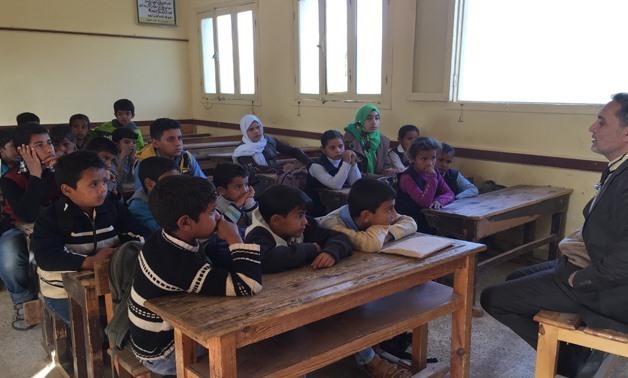
Students of a primary school in North Sinai - Egypt Today/Mohamed Hussein
CAIRO – 6 May 2018: Mohamed Hani Abaza, deputy head of the Parliament’s Education Committee, said Saturday that the new educational system aims to strengthen the [youth’s] sense of belongingness to the country.
Is the current system with its exams, teachers and private lessons satisfying? Abaza said in an interview with Wael al-Ebrashi on Dream, denouncing the objection of some students’ parents to the new system.
Abaza called on the Ministry of Education to illustrate to the parents the new system, ignoring the rumors saying that education according to the new system will be harder.
Abaza said that changing the educational system is a very critical issue that the outdated Egyptian regimes did not dare to mess with it.
A lawsuit was filed by several parents demanding the cancellation of the ministry’s decision to make primary students of the experimental language schools study science and math in Arabic instead of English. Experimental schools belong to the government. The lawsuit has been postponed by the Administrative Court until June 3.
The ministry claims that “Arabizing the curriculum” is not a precise description of the new system, as students of the experimental schools will be taught an advanced Arabic curriculum of math and science, which will be taught together as one subject.
Following the primary stage, students will take science and math classes in English, as two separate subjects, and will start learning another foreign language. Most students in Egypt normally learn French or German as a third language.
The ministry also affirmed that students will study the English language during the primary stage and will be taught scientific and mathematical expressions in English.
The private language schools will not be obliged to teach students science and math in Arabic. However, they will have to stick to the new curriculum that will be applied on students entering primary school in 2019.
The private schools will be allowed to translate the ministry’s curriculum from Arabic to English or French, according to Education Minister Tarek Shawki.
Following his decision on April 30 to make the study of science and math in the government-owned experimental schools in English, Shawki said that the cost of translating the governmental curricula from Arabic to English is very high and that the government cannot afford it anymore.
Several mothers protested in front of the Education Ministry in opposition to the decision. However, Shawki affirmed during his conference that the decision has already been made and that “no further discussion shall be opened in this regard.”
Egypt has a large number of experimental language schools across the country, including 221 in Cairo, 59 in Giza and 79 in Alexandria.
The new system supports the study of both Arabic and English languages. However, the priority is given to the Arabic language in order to eliminate its illiteracy and establish the Arabic Egyptian identity, Hassan Shehata, professor of curricula and teaching methods in the Faculty of Education, Ain Shams University, said Saturday.
In an interview with Ahmed Moussa on Sada Al-Balad, Shehata claimed that scientific research showed that learning a foreign language besides the native Arabic language makes learning the Arabic language harder.
“I have never worked in politics, and I have never believed in the conspiracy theory until I [personally] saw some people attacking the new system,” Shawki said in an interview with Tamer Amin on Al-Hayah on Saturday.
Shawki said that education is the only way through which we can achieve progress, and that many states around us do not want Egypt to achieve this progress, adding that this “fierce war” requires us to be fully aware, and to stand by each other.

Comments
Leave a Comment